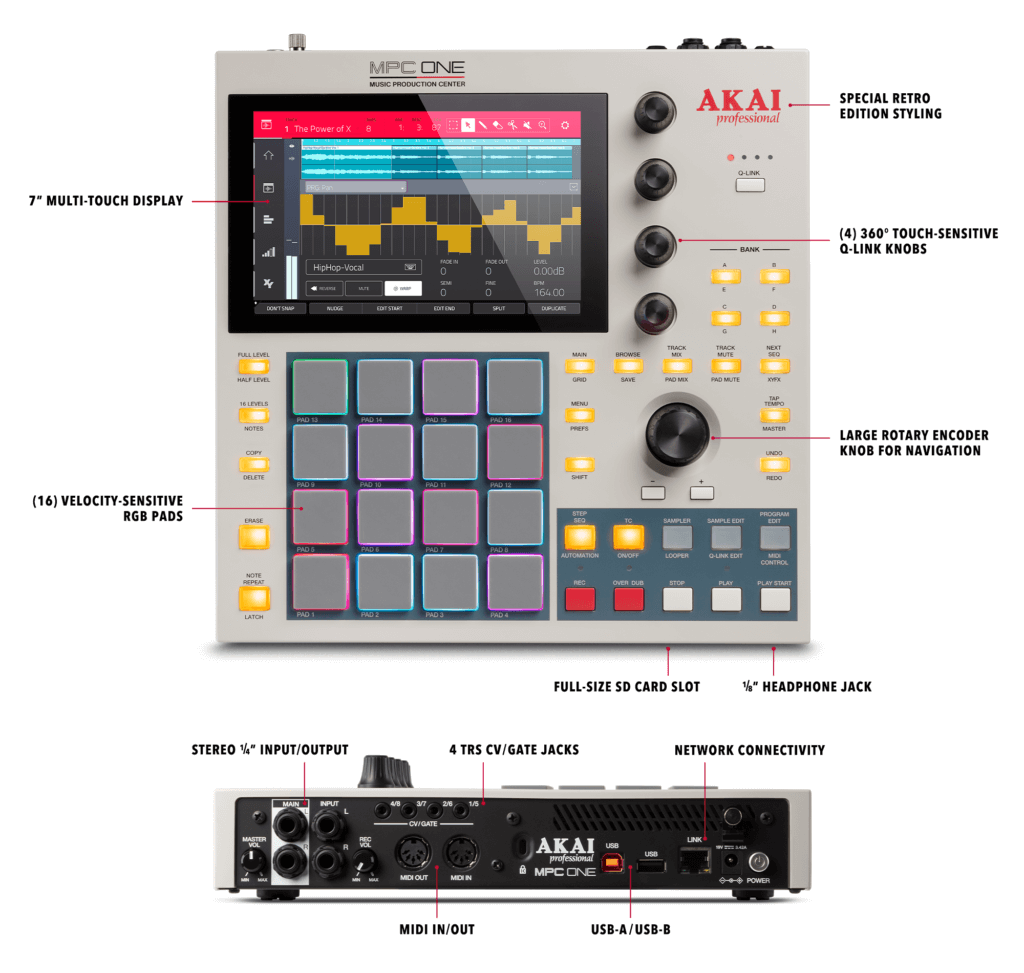In the world of standalone samplers and drum machines, Akai has certainly made their mark on the industry with over 30+ years of MPC innovation.
One of THE go-to instruments for drum beats, sampling and loop creation, the MPC One represents the pinnacle of stand-alone hardware for beatmakers, and songwriters alike (more on this in our next issue, stay tuned).
Construction-wise, the new MPC One is built like a tank, and the pads have that signature Akai feel and response. They’re velocity sensitive, but not rubbery or bouncy like other pad-based grids we’ve tested. So if you plan on testing your finger drumming skills, you should have no issues here. Yes, people on forums might quibble that the pads are every-so-slightly smaller than others in the range, but honestly after about 10 seconds, your muscle memory kicks in and it’s frankly a non-issue.
Looks-wise, the review unit we received sports a new retro-flavored skin, which is a cool, grey throwback to the vintage MPC brethren of years gone by. Digging into the software, we just feel more at home than on a Maschine. And while that might be personal preference, we do prefer having the option of untethering from a computer to make beats and string entire songs together without the need for a PC. Having a stand-alone workflow is what the MPC is all about, and the touchscreen and updated OS that Akai have developed are both…chef’s kiss.
On the rear, you’ve got your ports for you main line inputs as well as full-sized MIDI plus CV/Gate, which makes this a great way to rig up your modular kit and control external synths pretty easily. Synth heads will also adore the automated sampling features so you can fire up your fave hardware patches, like we did with our Moog Sub Phatty, then easily import them across the keyboard and map the sounds to the grid. You can also easily adjust scales and one-pad chords on-the-fly, which means you can take your favorite sounds to-go, without lugging all your keyboards, AND be able to lay down parts quickly and easily without an external MIDI controller.
One small gripe is the lack of microphone inputs and even a phono input for importing vinyl samples to slice up, but keep in mind this is the entry point for the MPC family. You can easily sample vinyl through the line inputs, and we even output line-levels from our mixer to get vocals loaded and ready for chop sessions pretty easy. So, there are workarounds.

If you want a piece of gear that can serve as the centerpiece of your beat-making production hub, this could be your gateway drug, no questions. And if you need a few more perks, like phono inputs or a battery for true mobile production, check out the MPC Live II. But we think the MPC One hits the sweet spot for those getting into programmed drums, sampling, and backing tracks. We even think it might be a killer DAW replacement for solo artists – which we’ll cover more in-depth in a future column.
PROS:
easy to use, standalone production, great pads and included sound sets.
CONS:
some features only found on higher-priced models (phono and mic inputs, battery, speakers)
STREET PRICE:
$899
